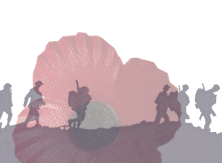The Kaplan Brothers

Their names will be remembered for evermoreLanding in the Middle East with his unit, Louis Kaplan wrote in his prayer book: "Arrived Jerusalem 21st day of June 1918." He also noted he would spend Rosh Hashanah, Jewish New Year, there. It was a deeply personal inscription for Kaplan, part of a unit that enabled Jews to follow religious observance while serving. He was one of four brothers who served in the war. Their parents, Levi and Leah, married in Lithuania in 1885 and left for Scotland shortly after. Levi worked as a travelling salesman, a path of self-employment followed by many in the Jewish community, reflecting their need to work around religious observance. Settling in The Gorbals The family had settled in The Gorbals, and their first son, Lazarus, was born in 1887, followed by Louis, Maurice, Ray, Davie and Dora. Levi died in 1902, leaving his wife to raise the children while selling drapery. Lazarus, who also became a draper, married and was living with his family in Devon Street when he signed up with The Royal Army Medical Corps, serving with a mobile field unit on the front line. Louis also married and had followed his parents and brother as a drapery traveller. He joined up in 1915, with the 38th (Labour) Battalion, The Royal Fusiliers, a unit staffed by Jewish soldiers, also known as the 1st Judean. Jewish observances were maintained while men served. The 38th Battalion was part of the Egyptian Expeditionary Force which evolved from defence of Egypt to an invasion of German-allied Ottoman Palestine. The unit landed in Alexandria and took part in Viscount Allenby's final Palestinian campaigns that September, as the end of the war drew near. Maurice Kaplan served as an air mechanic with The Royal Flying Corps. After the war, he too married and worked as a picture framer. The youngest brother, David, joined The Royal Field Artillery as a gunner in 1916. He probably served with the 152nd Brigade, which took part in the Arras Offensive and the Third Battle of Ypres in 1917. Cheers for the King The Jewish community turned out in force when George V visited Glasgow for a tour of shipyards and steelworks in September 1917. The Glasgow Herald reported: "The fervour reached crescendo in The Gorbals ... Jewry lined the streets in its thousands ... [cheering] was hearty." In 1921 The British Jewry Book of Honour recorded their contribution to the war effort, listing those who gave their lives, as well those who returned safely, as did all the Kaplans. View the original referenced text here: Kaplan Brothers (PDF, 99 KB) |
Images:
|








